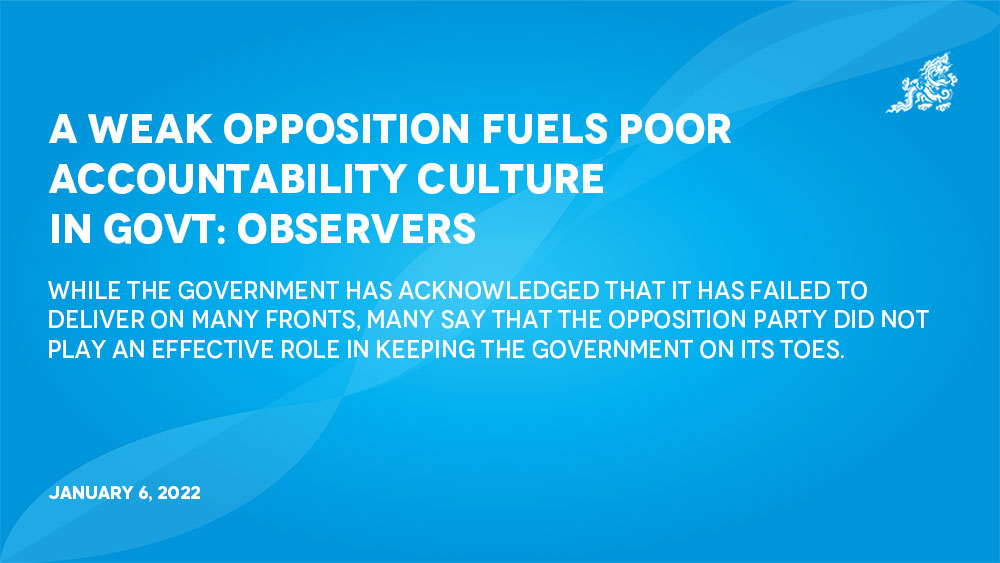MB Subba
While the government has acknowledged that it has failed to deliver on many fronts, many say that the Opposition Party did not play an effective role in keeping the government on its toes.
A weak opposition party, observers say, fails to put a check on the government’s actions by questioning them and therefore fuels “poor governance”. They also claimed it supports a poor accountability culture in the government.
The Prime Minister did not present the State of the Nation in the winter session of Parliament in 2020. Although some MPs said the prime minister had violated the Constitution, the Opposition maintained silence on the issue.
Although the Opposition has questioned the government on a few issues, including inflation and unfulfilled pledges, observers say that the voices have not been effective and loud.
They say that it is also the responsibility of Parliament to hold the government accountable but that often decisions of the lower House are taken on party lines.
Lack of enough support from members of the ruling party and the National Council for the Opposition’s stand on national issues is also seen as one of the problems.
A former National Council member, Tharchen, said it was important for an Opposition to have the temperament to play an effective role in providing checks and balances.
“The tone of the Opposition’s voice has become very mild. It’s unfortunate that the government is getting more pressure from social media users than the Opposition,” he said.
However, he added that important issues raised sometimes by the Opposition had failed to receive due attention from members of the ruling party and the National Council. “The Opposition could be indirectly responsible for the government’s lapses.”
The general secretary of People’s Democratic Party (PDP), Kuenga Tashi, said the Opposition’s role had become more crucial to hold the government to account.
“For the PDP, any democratic institution mandated by the people failing to do their job is disappointing,” he said, adding that the party is concerned about “weakening governance” and other issues concerning the economy and employment.
He said that presenting the State of the Nation report in Parliament was not only a constitutional requirement but also a national obligation and that the failure to do so was “unacceptable”.
However, while the opposition leader did not comment, Opposition members say that they are happy with their role in the House but that more could be done outside the Parliament.
Opposition MP Ugyen Wangdi said the Opposition’s role outside of parliament was faced with financial and manpower constraints. “The Opposition will take a stand only on national issues.”
Dewathang Gomdar MP Ugyen Dorji said the Opposition had exercised critical roles in maintaining checks and balances, although there was only so much it could do.
He said that the party had fulfilled its mandate within the Constitution and the National Assembly Act. However, he added that it is difficult for the Opposition to live up to every individual’s expectations.
One of the editors in the print media said that the Opposition was as important as the government and that the Constitution provided for a strong Opposition through the two-party system to maintain checks and balances.
He said that democracy would flourish only if the Opposition is strong. “Although the country had an opposition party with experienced members, they have not lived up to the expectation.”
According to him, the Opposition’s voices on the Mines and Minerals Bill and recent reports of the finance minister diverting Nu 19 million to his constituency in Paro were weak.
“I would say that the Opposition has set very low standards for future opposition parties, which is not what the architects of democratic Bhutan had thought of,” he added.
Observers said that the Royal address of the 114th National Day summed up the true state of the nation and that Prime Minister Dr Lotay Tshering in his State of the Nation report had acknowledged the government’s failures.
However, the Prime Minister said that the situation started to deteriorate from the first government’s term.
“The State of the Nation comes just a few days after the extraordinary Royal Address on the National Day,” he told the joint sitting of the recently concluded Parliament.
“The nation has been receiving wake-up calls from His Majesty for over 15 years now and we have miserably failed to come out of sleep,” he said, adding that the nation has been redirected to a new course.


